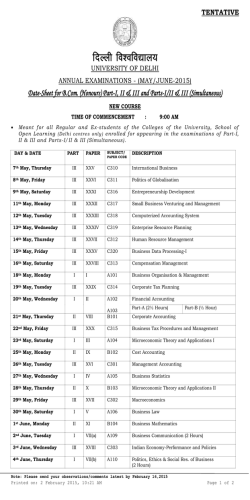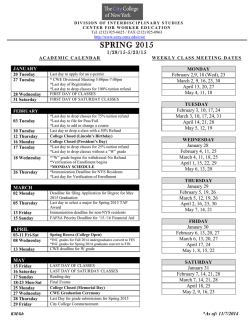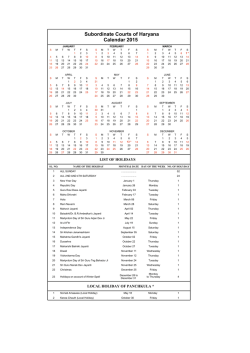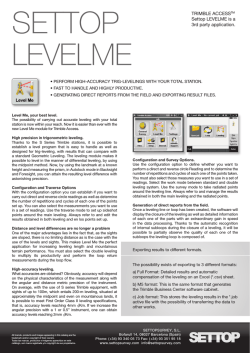
API-303 Game Theory and Strategic Decisions
Last Updated: January 30, 2015 API-303 Game Theory and Strategic Decisions Course syllabus Spring 2015 Faculty: Janina Matuszeski Email: [email protected] Office: L208 Phone: 617-495-3561 Faculty Assistant: Sarah McLain Email: [email protected] Office: 124 Mt. Auburn - Suite 200N-217A Teaching Fellow: Alice Heath Email: [email protected] Office Hours: TBD Course Assistant: Jason Peuquet Email: [email protected] Office Hours: TBD Weekly Schedule Lecture (L130) Monday Tuesday 11:40am – 1pm Thursday 11:40am – 1pm Friday * Or by appointment Section (LAND) Prof. Matuszeski* Office Hours TF CA 3-4pm 11:40am – 1pm 1-3pm Course Description: This course uses game theory to study incentives and strategic behavior in practical situations of inter-dependent decision making and negotiations. The course will develop basic theoretical concepts in tandem with applications from a variety of areas, including bargaining, competition, and strategic voting. Grading: The class grade will be based on the following criteria: 20% - Problem Sets 20% - Midterm (in class) 30% - Group assignment: presentation and paper 30% - Final exam REQUIRED ATTENDANCE DATES This course includes mandatory attendance on Friday, April 3. Attendance is ALSO required for all students during the week of group presentations (Tuesday, April 28 and Thursday, April 30) and the final exam (9am-noon on Thursday, May 7). DO NOT take this course if you cannot commit to attend on April 3, 28 and 30 from 11:40am to 1pm and May 7 from 9am to noon. Last Updated: January 30, 2015 Prerequisites: There are no formal prerequisites. The course is designed to be accessible to all Kennedy School students, regardless of mathematical background. The lectures emphasize conceptual rather than technical material, however, additional technical material will be provided as optional readings. Books Required textbook: Avinash Dixit, Susan Skeath, and David H. Reiley, Jr. Games of Strategy. 3rd Edition. Norton. 2009 Recommended books: There will be some readings from these books and they are generally useful books to have. These may be purchased at the COOP. However, you are not required to purchase these books. Any readings from these will be available either through OCM or HKS library reserves. Avinash K. Dixit and Barry J. Nalebuff. The Art of Strategy. Norton. 2008. [An accessible book, with lots of great real-life examples. 2010 edition available at HKS reserves – readings available on course page.] David Kreps. Game Theory and Economic Modeling. Oxford/Clarendon, 1990. [Short, relatively clear chapters. A good complement to the main textbook. 3 copies available at HKS reserves and online reproduction available through HOLLIS – readings available on course page] Other books: These books are more advanced or on specialty topics. Required readings from these will be rare and will be available either through OCM or HKS library reserves. All of these books are available via HKS reserves (except for possibly Morrow). Roy Gardner. Games for Business and Economics. Wiley. 1995. [This has lots of interesting real life topics. It focuses on how to set up the game, not just how to solve it. But, the organization of the book is not very clear. Written at an advanced level for some topics. 2 copies available at HKS reserves – readings available on course page.] John McMillan. Games, Strategies, and Managers. Oxford University Press. 1996. [Focuses on real-world applications. Written at an advanced level. 3 copies available at HKS reserves – readings available on course page.] James D. Morrow. Game Theory for Political Scientists. Princeton University Press. 1994. [A focus on political examples. 1 copy available at HKS reserves.] Howard Raiffa. The Art and Science of Negotiation. Harvard University Press. 1982. [4 copies available at HKS reserves.] Thomas Schelling. Micromotives and Macrobehavior. Norton. 1978 (Rev Ed 2006). [A classic text. Not always politically correct, but with very interesting, in-depth, real-world examples. Written at an advanced level. 1 copy available at HKS reserves – readings available on course page.] Thomas Schelling. The Strategy of Conflict. Harvard University Press. 1960 (Reprinted1980). [Ditto. 4 copies available at HKS reserves – readings available on course page] Robert Axelrod, Robert M. The Evolution of Cooperation. BasicPerseus Books, Rev. Ed 2006. [There is one advanced reading from this book but it is NOT available on the course page. 1 copy available at HKS reserves.] Last Updated: January 30, 2015 Requirements Readings: Required readings are marked with an [R]. These are often short, topical articles from the popular press. Textbook readings are marked with [T]. ALL students are expected to do the Required [R] and Textbook [T] readings BEFORE class. Advanced readings are marked with an [A] and are strongly encouraged for all students, particularly those with a stronger economics or quantitative background. These readings contain important and innovative ideas that may or may not be covered in other parts of the course. Advanced readings are not required. Not every class has every kind of reading. Group Project: The student group project will require you to apply game theoretical concepts to an area of your special interest, e.g. business, politics, or society. Students will be assigned to teams of 2-3 students, based on stated mutual interests. At the end of the semester, each team will make a short presentation of the issue during class and will submit a joint 5-page paper. The student group project will count for 30% of your grade. When submitting the paper, teams may choose to state that everyone contributed jointly to the assignment or to list the individual contributions of each team member. Individual, confidential surveys mid-way through the group work will allow students to share successes and challenges of the group project with the faculty member. Problem Sets: There will be eight short problem sets, which will be graded. Problem sets count for 20% of the grade (2.5% each). Small groups of students—no more than four—are encouraged to work together on the problem sets. Problem solutions must be written independently by each of the students in the small group and must indicate the names of the students in the group. All problem sets are due at class time. Answers to the problem sets will be posted on the class web site shortly after they are turned in. Problem sets turned in after the class time on the due date will not receive any credit. Problem Set and Assignment Due Dates: Date Thursday, February 5 Thursday, February 12 Tuesday, February 17 Tuesday, February 24 Tuesday, March 3 Tuesday, March 10 Thursday, March 12 Thursday, March 24 Thursday, April 2 Thursday, April 9 Thursday, April 16 Tuesday, April 28 & Thursday, April 30 Thursday, May 7 Tuesday, May 12 Assignment(s) Due Problem Set 1 Group project - Areas of interest form Problem Set 2 Group project - Teams announced Problem Set 3 Problem Set 4 Group project – Problem area description Problem Set 5 MIDTERM Problem Set 6 Problem Set 7 Group project – Draft game due Problem Set 8 Group project – Presentations in class Final exam Group project – Final 5 page paper Last Updated: January 30, 2015 Course page software pilot: This course has been selected to participate in a pilot of new course page software, Canvas. The software will allow for accurate tracking of class participation and attendance, submission of assignments, and several class discussions. A class discussion on the course page will be an ongoing place for students to post what is and what is not working about the new system. Your participation and feedback about Canvas as a tool will help with the HKS-wide roll-out of the software in Fall 2015. And you will all already be experts! Options for more advanced students This course attracts talented students with a range of background in game theory and quantitative subjects. Some students have no prior exposure to game theory and/or quantitative topics while others have extensive prior experience. All students bring valuable real world and academic experience to the course and all are welcome. ADVANCED PROBLEM SETS To aid in helping students tailor the class to be most useful to them, each student will decide in the first week whether they will complete the Advanced problem on each of the first five problem sets. (Problem Sets 6-8 will not have an Advanced question.) Students with a stronger economics or quantitative background are encouraged to choose this option, but it is not required. If a student decides to commit to do these five Advanced problems, he or she will be graded based on their performance including that Advance problem, for the first five problem sets. Between the second and third problem set, students may ask the faculty member to switch either into or out of doing the Advanced problems. READINGS Students looking for additional challenges in this course can also choose to do many of the advanced readings. Questions or thoughts about these readings can be addressed in class or in office hours. Note on source of teaching materials: The design of this course including readings and lecture slides is attributable to Dr. Pinar Doğan who taught this course for many years. I am grateful. Last Updated: January 30, 2015 Detailed Schedule and Readings (Tentative) “DSR” is Dixit, Skeath and Reiley (2009) All readings aside from the DSR textbook are available online via the course page (Exceptions: Mar 10 “Burning the boats…” will be a paper handout; the Feb 18 Axelrod reading is available at HKS reserves.) Thursday, January 29: Introduction and Foundations of Game Theory [T] DSR, Chapters 1 and 2. [R] "War games." The Economist. 15 October 2005. p. 82. [A] Kreps, Chapters 1 and 2 in Game Theory and Economic Modelling. [A readings for today give other perspectives and framing for game theory.] [A] Tucker, Joshua. "Lebron, Make Up Your Mind Quickly." Washington Post. 8 July 2014. Tuesday, February 3: Prisoners’ Dilemma and its Applications; Intro to Nash Equilbrium [T] DSR, Chapter 4, Section 4.3. [R] "The Malls Get Decked: Retailers Minding Too Many Stores." The Street.com. 22 November 2000. [R] "Why We’re So Nice: We’re Wired to Cooperate." The New York Times. 23 July 2002. [A] Kreps, Chapter 3 in Game Theory and Economic Modelling. (especially pg 9-13, 26-28) Thursday, February 5: Pure Strategy Nash Equilibrium; Multiple Nash Equilibria and Equilibrium Selection [T] DSR, Chapter 4, Sections 4.1, 4.2, 4.4, 4.6, 4.7 and 4.8 [R] "Amazon and the state of Illinois play a game of chicken over online tax collection." mindyourdecisions.com [A] DSR, Chapter 5, Sections 5.1 and 5.2 [A discussion of continuous strategies, plus real world evidence on Nash Equilibria] [A] Munro et al. "ATM Banking + Game Theory = Profits." A.T. Kearney Report. [A straightforward article on another application of game theory.] Last Updated: January 30, 2015 Tuesday, February 10: Prisoner’s Dilemma Simulation Materials TBD Monday, February 9 and Thursday, February 12: Min-Max and Mixed Strategies [T] DSR, Chapter 7, Sections 7.1, 7.2, 7.3, 7.4, 7.6, 7.7 (except 7.2.C); Chapter 4, Section 4.5 [R] "Game Theory for Swingers: What states should the candidates visit before Election Day?" Slate. 25 October 2004. [R] "Rock, Paper, Payoff: Child’s Play Wins Auction House an Art Sale." The New York Times. 29 April 2005. [R] "World Cup Game Theory." Slate. 24 June 2006. [A] "The Art of the Save. for Goalie and Investor." The New York Times. 1 March 2008. [More subtle analysis of penalty kicks than the [R] reading.] [A] Gardner. "Mixed Strategies and Bluffing: Liar’s Poker." Section 3.3 in Games for Business and Economics. pp. 74-78. [Excellent example of mixing strategies, using a very simple poker game.] [A] DSR, Chapter 7, Section 7.5 [A big picture discussion of some aspects of mixed strategies. Short.] Tuesday, February 17: Repeated Games [T] DSR, Chapter 11, Sections 11.1-11.3 [A] Axelrod. The Evolution of Cooperation. Perseus Books (Rev Ed 2006). Chapters 1-4. 3-87. (Only available on reserve) Thursday, February 19: Collection Action and Collective Inaction Games [T] DSR, Chapter 12. [Heavier going than other assigned textbook readings. Take your time and take in what you can.] [R] Schelling. "Thermostats, Lemons, and Other Families of Models." Chapter 3 in Micromotives and Macrobehavior. 83-133. [Very entertaining and insightful, although the language is dated This gives the general motivation for today’s lecture..] Last Updated: January 30, 2015 [A] Schelling. “Hockey Helmets, Daylight Saving, and Other Binary Choices.” Chapter 7 in Micromotives and Macrobehavior. 213-243. [An in-depth look at binary choice games with more than two people. This is heavier on theory, but do-able.] Tuesday, February 24: Special Lecture on Elinor Ostrom’s Contributions to Collective (In)Action Problems [R] Ostrom. "Collective Action and the Evolution of Social Norms.” Journal of Economic Perspectives. 2000. Vol. 14(3). 137-158. [JEP articles are a great resource for overviews of the current state of a field, in this case research on collective action.] [R] Elster. "Social Norms and Economic Theory." Journal of Economic Perspectives. 1989. Vol. (3)4. 99-117. [This article is long but it is relatively straightforward, contains important content and is worth reading carefully.] [A] Ostrom. "A Behavioral Approach to the Rational Choice Theory of Collective Action: Presidential Address. American Political Science Association. 1997." The American Political Science Review. 1998. Vol. 92(1) (Mar., 1998). 1-22. Thursday, February 26: Sequential-Move Games [T] DSR, Chapter 3 Tuesday, March 3: Simultaneous and Sequential-Moves Combined: Subgame Perfect Nash Equilibrium (SPNE) [T] DSR, Chapter 6 Thursday, March 5: Subgame Perfection and Strategic Moves [T] DSR, Chapter 10. [R] "When It Can Be Good to Burn Your Boats." Financial Times. 25 October 1999. (Available as a handout) Tuesday, March 10: Application of SPNE to Bargaining [T] DSR, Chapter 18, Sections 18.3-18.5. [A] Roth et al. “Bargaining and Market Behavior in Jerusalem, Ljubljana, Pittsburgh, and Tokyo.” American Economic Review. 1991. Vol. 81(5). 1068-1095. [Strongly recommended that you read this. It’s very interesting information about the realities of bargaining and how culture plays a role.] Last Updated: January 30, 2015 Thursday, March 12: Midterm (on material up through and including Feb 24) Tuesday, March 17, Thursday, March 19: Spring Break (no classes) Feel free to do reading for Tuesday, March 31 in advance. There are a lot of required readings for this class so it’s too much to do the night before class. They are all relatively straightforward, rich in ideas, and of great relevance for public policy. Tuesday, March 24: Introduction to Games with Incomplete Information [T] DSR, Chapter 9, Section 9.2. [A] Logren, Persson and Weibull. "Markets with Asymmetric Information: The Contributions of George Akerlof, Michael Spence and Joseph Stiglitz." Scandinavian Journal of Economics. 2002. Vol. 104(2). 195-211. Thursday, March 26: NO CLASS Tuesday, March 31: Moral Hazard and Adverse Selection [T] DSR, Chapter 9, Sections 9 (intro pages), 9.4.A. NOTE to students: There are a lot of required readings for this class, but they are all relatively straightforward, rich in ideas, and of great relevance for public policy. In spite of the number, you are expected to have completed all of these readings before class. Three are short (including the textbook reading) and the final R reading is longer. [R] "The moral-hazard myth." The New Yorker. 29 August 2005. [R] "Writing off tyrants’ debt is a principle that should be extended to even poorer nations." The Guardian. 21 April 2003. [R] McMillan. "Creating Incentives" and "Designing Contracts." Chapters 8 and 9 in Games, Strategies, and Managers. [A] Gneezy, Meier, and Rey-Biel. "When and Why Incentives (Don’t) Work to Modify Behavior." Journal of Economic Perspectives. 2011. Vol. 25(4). 191—210. [A fantastic article, considering the psychology side of incentives, so it’s a more nuanced view than the basic principle-agent model.] Thursday, April 2 and Friday, April 3: Signaling games [T] DSR, Chapter 9, Sections 9.4.B, 9.5, and 9.6. [R] Dixit and Nalebuff. Chapter 8 in The Art of Strategy. [This is a great chapter with lots of great stories and examples and little math. I recommend reading it if you have time.] Last Updated: January 30, 2015 Tuesday, April 7: Cheap Talk [T] DSR, Section 9.3. [A] Farrell and Rabin. “Cheap Talk.” Journal of Economic Perspectives. 1996. Vol. 10(3). 103-118. Thursday, April 9 and Tuesday, April 14: Auctions [T] DSR. Chapter 17. [R] "The Agony of Victory: Online Auctions and the Winner’s Curse." Slate. 19 March 1999. [R] McMillan. "Bidding in Competition" and "Bidding in Olympic Competition." Chapters 11 and 12 in Games, Strategies, and Managers. 133-159. [R] "Economic focus: Bidding adieu?" The Economist. 29 June 2002. [A] McMillan. "Selling Spectrum Rights." Journal of Economic Perspectives. 1994. Vol. 8(3). 145-62. Thursday, April 16 and Tuesday, April 21: Strategy and Voting [T] DSR, Chapter 16. [A] Shepsle and Bonchek. "Strategic Behavior" and "Voting Methods and Electoral Systems." Chapters 6 and 7 in Analyzing Politics. Norton 1997. 137-191. Thursday, April 23: Cooperative Game Theory and the Core Readings TBD Tuesday, April 28: Presentation of group projects I Thursday, April 30: Presentation of group projects II Thursday, April 30 - evening: Optional Lecture on Behavioral Game Theory Thursday, May 7: Final Exam (9am-noon) Tuesday, May 12: Group Assignment Final Paper due at 11:55pm
© Copyright 2026






